Organizational Behaviour Report: Tesco's Performance Analysis
VerifiedAdded on 2023/01/04
|15
|4851
|41
Report
AI Summary
This report provides a comprehensive analysis of organizational behaviour within Tesco, a multinational retailer. It begins by examining how organizational culture, politics, and power dynamics influence individual and team behaviour and performance, exploring concepts like coercive, reward, expert, and informational power, and the impact of both positive and negative workplace politics. The report then evaluates content and process theories of motivation, specifically Maslow's hierarchy of needs and Vroom's expectancy theory, to assess how motivational techniques enable effective goal achievement within Tesco. The analysis further delves into what constitutes an effective team versus an ineffective team, and applies concepts and philosophies of organizational behaviour to a given situation within the organization, justifying how these theories can contribute to organizational growth. The report offers a detailed understanding of the factors influencing employee behaviour and performance in a large retail environment.
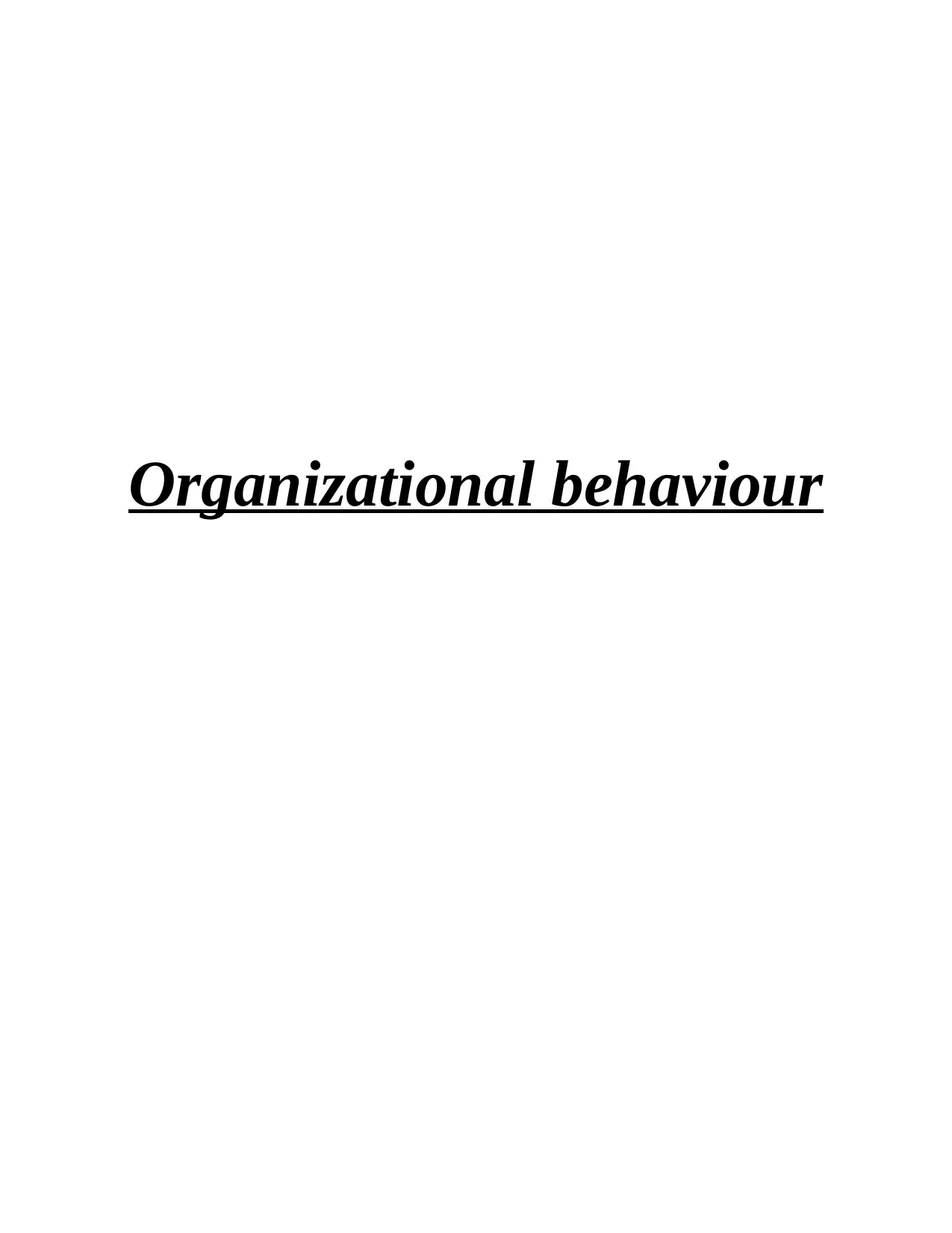
Organizational behaviour
Paraphrase This Document
Need a fresh take? Get an instant paraphrase of this document with our AI Paraphraser
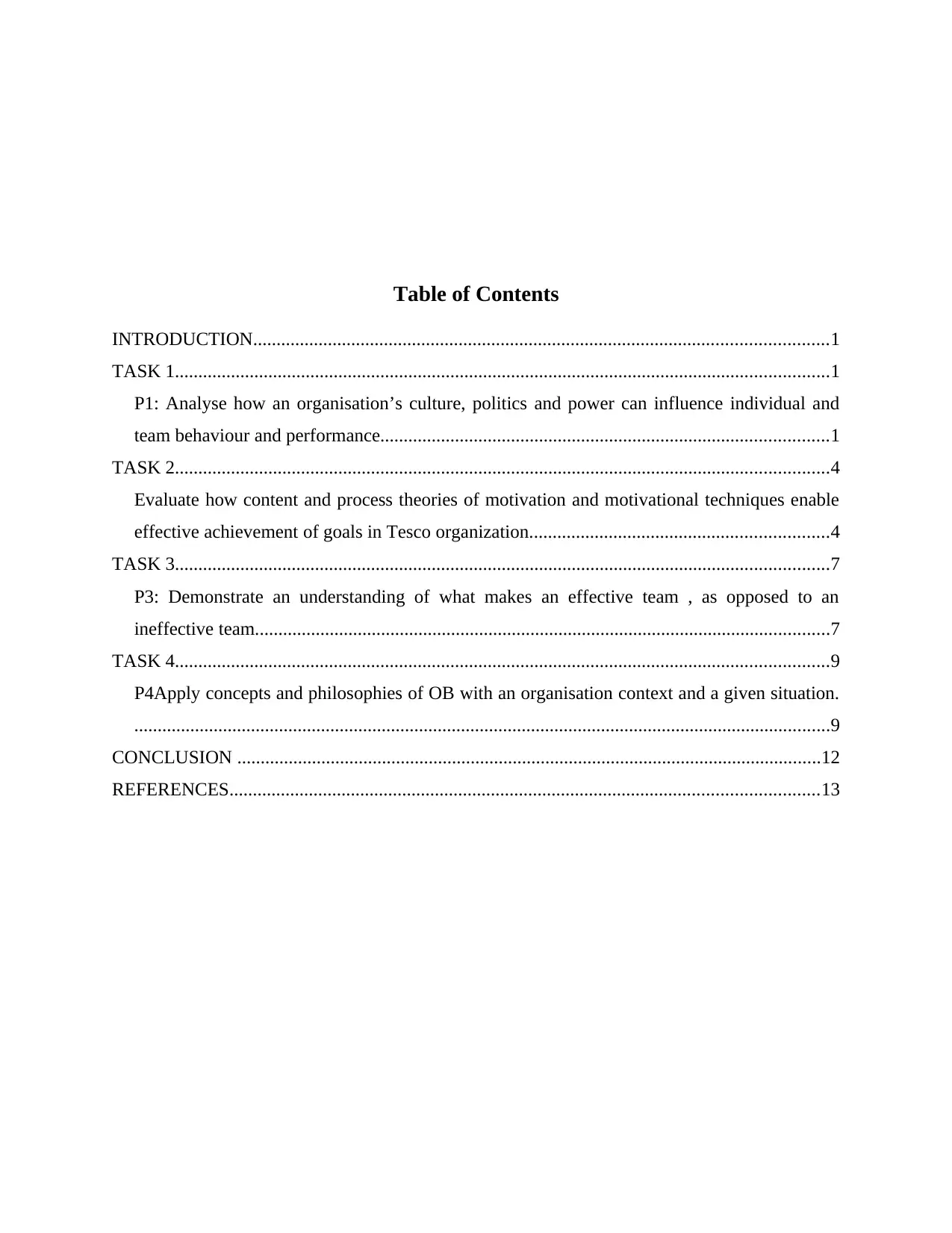
Table of Contents
INTRODUCTION...........................................................................................................................1
TASK 1............................................................................................................................................1
P1: Analyse how an organisation’s culture, politics and power can influence individual and
team behaviour and performance................................................................................................1
TASK 2............................................................................................................................................4
Evaluate how content and process theories of motivation and motivational techniques enable
effective achievement of goals in Tesco organization................................................................4
TASK 3............................................................................................................................................7
P3: Demonstrate an understanding of what makes an effective team , as opposed to an
ineffective team...........................................................................................................................7
TASK 4............................................................................................................................................9
P4Apply concepts and philosophies of OB with an organisation context and a given situation.
.....................................................................................................................................................9
CONCLUSION .............................................................................................................................12
REFERENCES..............................................................................................................................13
INTRODUCTION...........................................................................................................................1
TASK 1............................................................................................................................................1
P1: Analyse how an organisation’s culture, politics and power can influence individual and
team behaviour and performance................................................................................................1
TASK 2............................................................................................................................................4
Evaluate how content and process theories of motivation and motivational techniques enable
effective achievement of goals in Tesco organization................................................................4
TASK 3............................................................................................................................................7
P3: Demonstrate an understanding of what makes an effective team , as opposed to an
ineffective team...........................................................................................................................7
TASK 4............................................................................................................................................9
P4Apply concepts and philosophies of OB with an organisation context and a given situation.
.....................................................................................................................................................9
CONCLUSION .............................................................................................................................12
REFERENCES..............................................................................................................................13
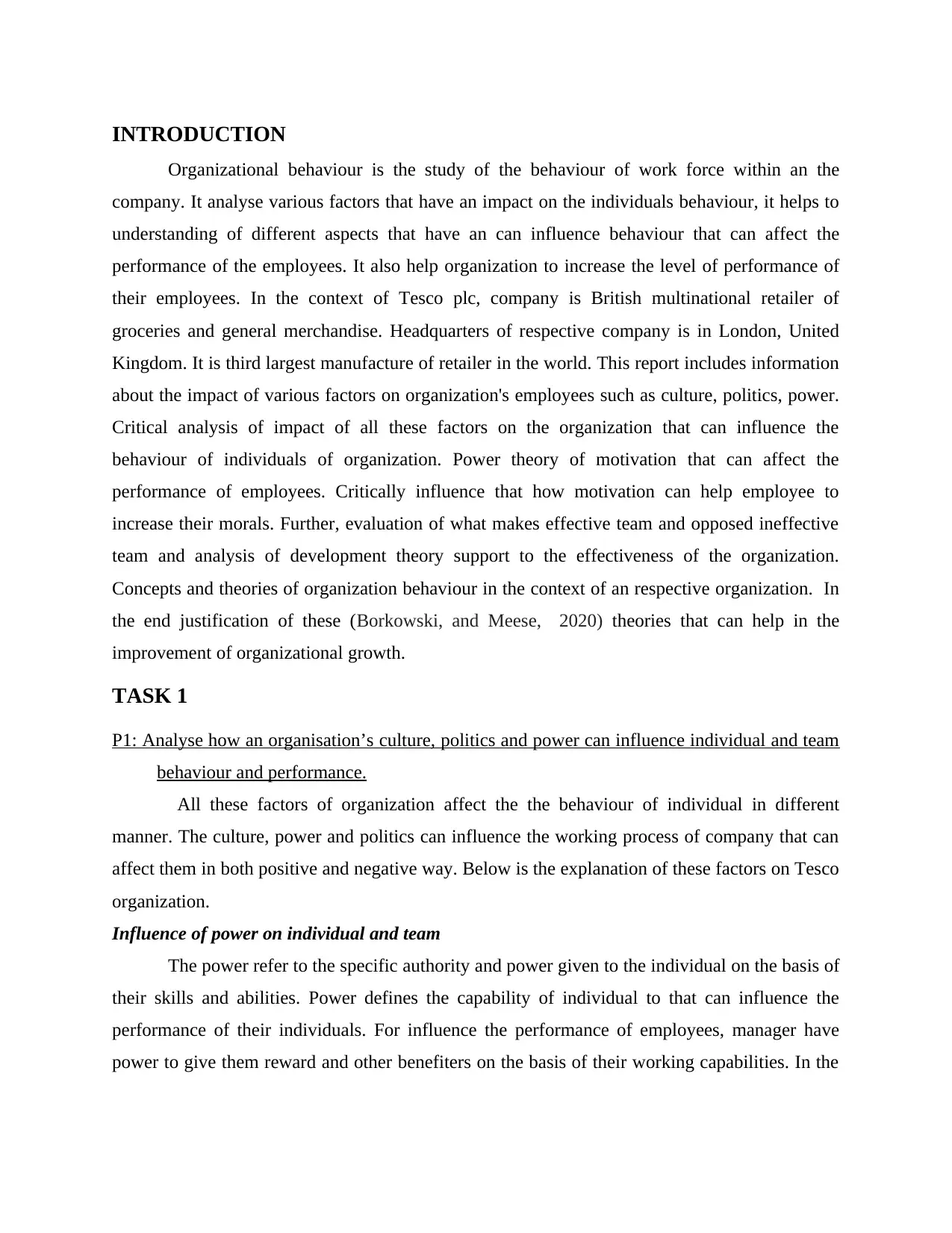
INTRODUCTION
Organizational behaviour is the study of the behaviour of work force within an the
company. It analyse various factors that have an impact on the individuals behaviour, it helps to
understanding of different aspects that have an can influence behaviour that can affect the
performance of the employees. It also help organization to increase the level of performance of
their employees. In the context of Tesco plc, company is British multinational retailer of
groceries and general merchandise. Headquarters of respective company is in London, United
Kingdom. It is third largest manufacture of retailer in the world. This report includes information
about the impact of various factors on organization's employees such as culture, politics, power.
Critical analysis of impact of all these factors on the organization that can influence the
behaviour of individuals of organization. Power theory of motivation that can affect the
performance of employees. Critically influence that how motivation can help employee to
increase their morals. Further, evaluation of what makes effective team and opposed ineffective
team and analysis of development theory support to the effectiveness of the organization.
Concepts and theories of organization behaviour in the context of an respective organization. In
the end justification of these (Borkowski, and Meese, 2020) theories that can help in the
improvement of organizational growth.
TASK 1
P1: Analyse how an organisation’s culture, politics and power can influence individual and team
behaviour and performance.
All these factors of organization affect the the behaviour of individual in different
manner. The culture, power and politics can influence the working process of company that can
affect them in both positive and negative way. Below is the explanation of these factors on Tesco
organization.
Influence of power on individual and team
The power refer to the specific authority and power given to the individual on the basis of
their skills and abilities. Power defines the capability of individual to that can influence the
performance of their individuals. For influence the performance of employees, manager have
power to give them reward and other benefiters on the basis of their working capabilities. In the
Organizational behaviour is the study of the behaviour of work force within an the
company. It analyse various factors that have an impact on the individuals behaviour, it helps to
understanding of different aspects that have an can influence behaviour that can affect the
performance of the employees. It also help organization to increase the level of performance of
their employees. In the context of Tesco plc, company is British multinational retailer of
groceries and general merchandise. Headquarters of respective company is in London, United
Kingdom. It is third largest manufacture of retailer in the world. This report includes information
about the impact of various factors on organization's employees such as culture, politics, power.
Critical analysis of impact of all these factors on the organization that can influence the
behaviour of individuals of organization. Power theory of motivation that can affect the
performance of employees. Critically influence that how motivation can help employee to
increase their morals. Further, evaluation of what makes effective team and opposed ineffective
team and analysis of development theory support to the effectiveness of the organization.
Concepts and theories of organization behaviour in the context of an respective organization. In
the end justification of these (Borkowski, and Meese, 2020) theories that can help in the
improvement of organizational growth.
TASK 1
P1: Analyse how an organisation’s culture, politics and power can influence individual and team
behaviour and performance.
All these factors of organization affect the the behaviour of individual in different
manner. The culture, power and politics can influence the working process of company that can
affect them in both positive and negative way. Below is the explanation of these factors on Tesco
organization.
Influence of power on individual and team
The power refer to the specific authority and power given to the individual on the basis of
their skills and abilities. Power defines the capability of individual to that can influence the
performance of their individuals. For influence the performance of employees, manager have
power to give them reward and other benefiters on the basis of their working capabilities. In the
⊘ This is a preview!⊘
Do you want full access?
Subscribe today to unlock all pages.

Trusted by 1+ million students worldwide
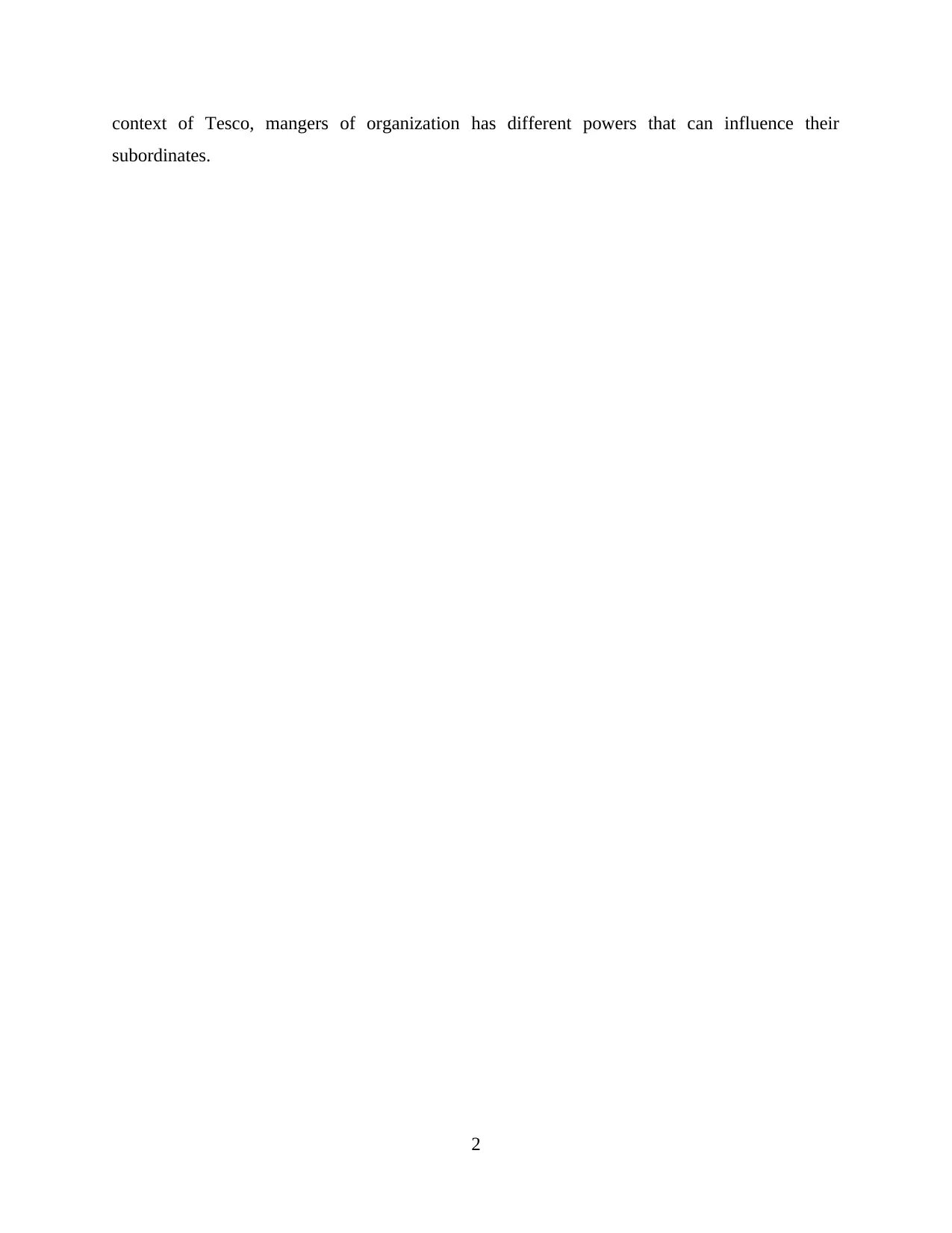
context of Tesco, mangers of organization has different powers that can influence their
subordinates.
2
subordinates.
2
Paraphrase This Document
Need a fresh take? Get an instant paraphrase of this document with our AI Paraphraser
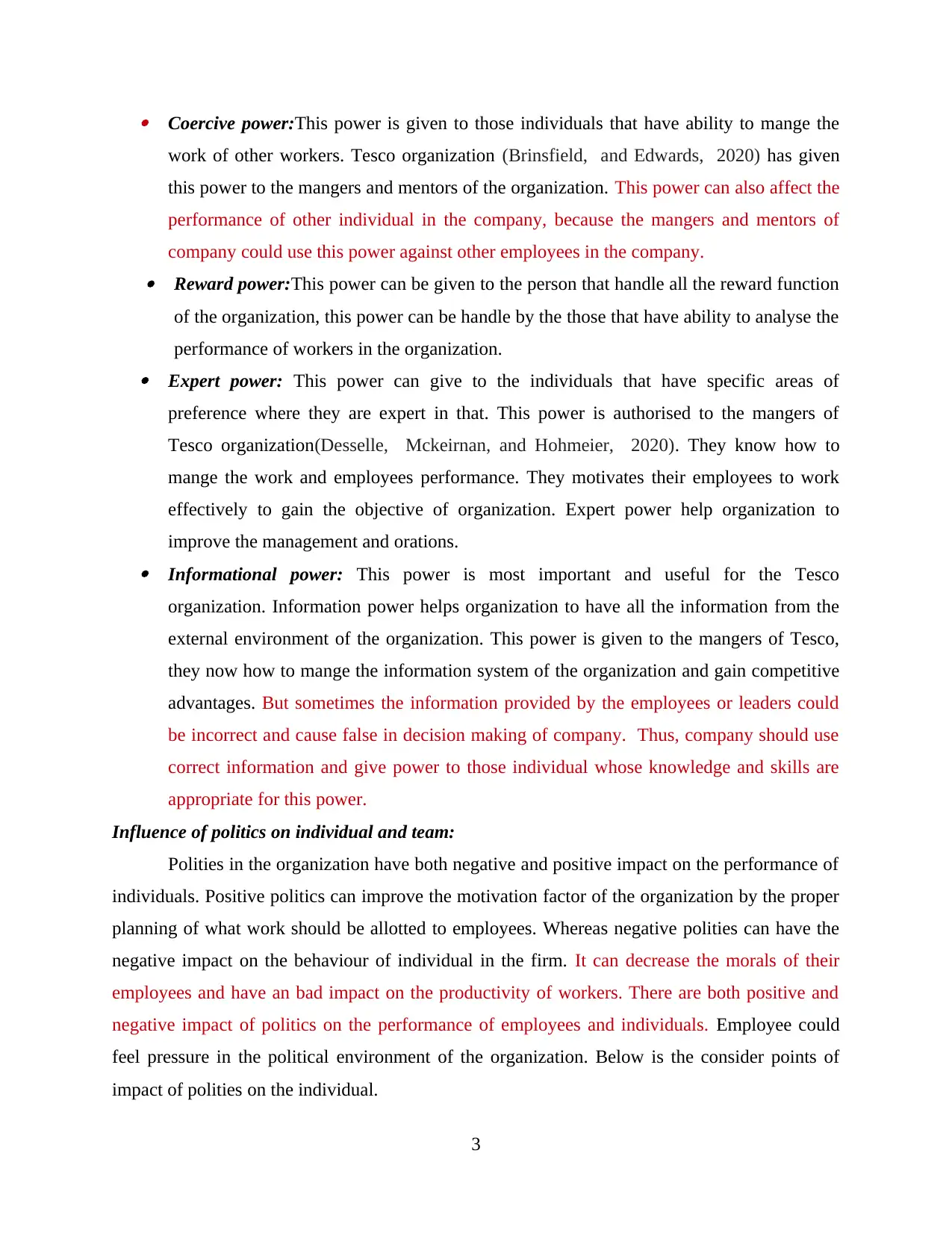
Coercive power:This power is given to those individuals that have ability to mange the
work of other workers. Tesco organization (Brinsfield, and Edwards, 2020) has given
this power to the mangers and mentors of the organization. This power can also affect the
performance of other individual in the company, because the mangers and mentors of
company could use this power against other employees in the company. Reward power:This power can be given to the person that handle all the reward function
of the organization, this power can be handle by the those that have ability to analyse the
performance of workers in the organization. Expert power: This power can give to the individuals that have specific areas of
preference where they are expert in that. This power is authorised to the mangers of
Tesco organization(Desselle, Mckeirnan, and Hohmeier, 2020). They know how to
mange the work and employees performance. They motivates their employees to work
effectively to gain the objective of organization. Expert power help organization to
improve the management and orations. Informational power: This power is most important and useful for the Tesco
organization. Information power helps organization to have all the information from the
external environment of the organization. This power is given to the mangers of Tesco,
they now how to mange the information system of the organization and gain competitive
advantages. But sometimes the information provided by the employees or leaders could
be incorrect and cause false in decision making of company. Thus, company should use
correct information and give power to those individual whose knowledge and skills are
appropriate for this power.
Influence of politics on individual and team:
Polities in the organization have both negative and positive impact on the performance of
individuals. Positive politics can improve the motivation factor of the organization by the proper
planning of what work should be allotted to employees. Whereas negative polities can have the
negative impact on the behaviour of individual in the firm. It can decrease the morals of their
employees and have an bad impact on the productivity of workers. There are both positive and
negative impact of politics on the performance of employees and individuals. Employee could
feel pressure in the political environment of the organization. Below is the consider points of
impact of polities on the individual.
3
work of other workers. Tesco organization (Brinsfield, and Edwards, 2020) has given
this power to the mangers and mentors of the organization. This power can also affect the
performance of other individual in the company, because the mangers and mentors of
company could use this power against other employees in the company. Reward power:This power can be given to the person that handle all the reward function
of the organization, this power can be handle by the those that have ability to analyse the
performance of workers in the organization. Expert power: This power can give to the individuals that have specific areas of
preference where they are expert in that. This power is authorised to the mangers of
Tesco organization(Desselle, Mckeirnan, and Hohmeier, 2020). They know how to
mange the work and employees performance. They motivates their employees to work
effectively to gain the objective of organization. Expert power help organization to
improve the management and orations. Informational power: This power is most important and useful for the Tesco
organization. Information power helps organization to have all the information from the
external environment of the organization. This power is given to the mangers of Tesco,
they now how to mange the information system of the organization and gain competitive
advantages. But sometimes the information provided by the employees or leaders could
be incorrect and cause false in decision making of company. Thus, company should use
correct information and give power to those individual whose knowledge and skills are
appropriate for this power.
Influence of politics on individual and team:
Polities in the organization have both negative and positive impact on the performance of
individuals. Positive politics can improve the motivation factor of the organization by the proper
planning of what work should be allotted to employees. Whereas negative polities can have the
negative impact on the behaviour of individual in the firm. It can decrease the morals of their
employees and have an bad impact on the productivity of workers. There are both positive and
negative impact of politics on the performance of employees and individuals. Employee could
feel pressure in the political environment of the organization. Below is the consider points of
impact of polities on the individual.
3
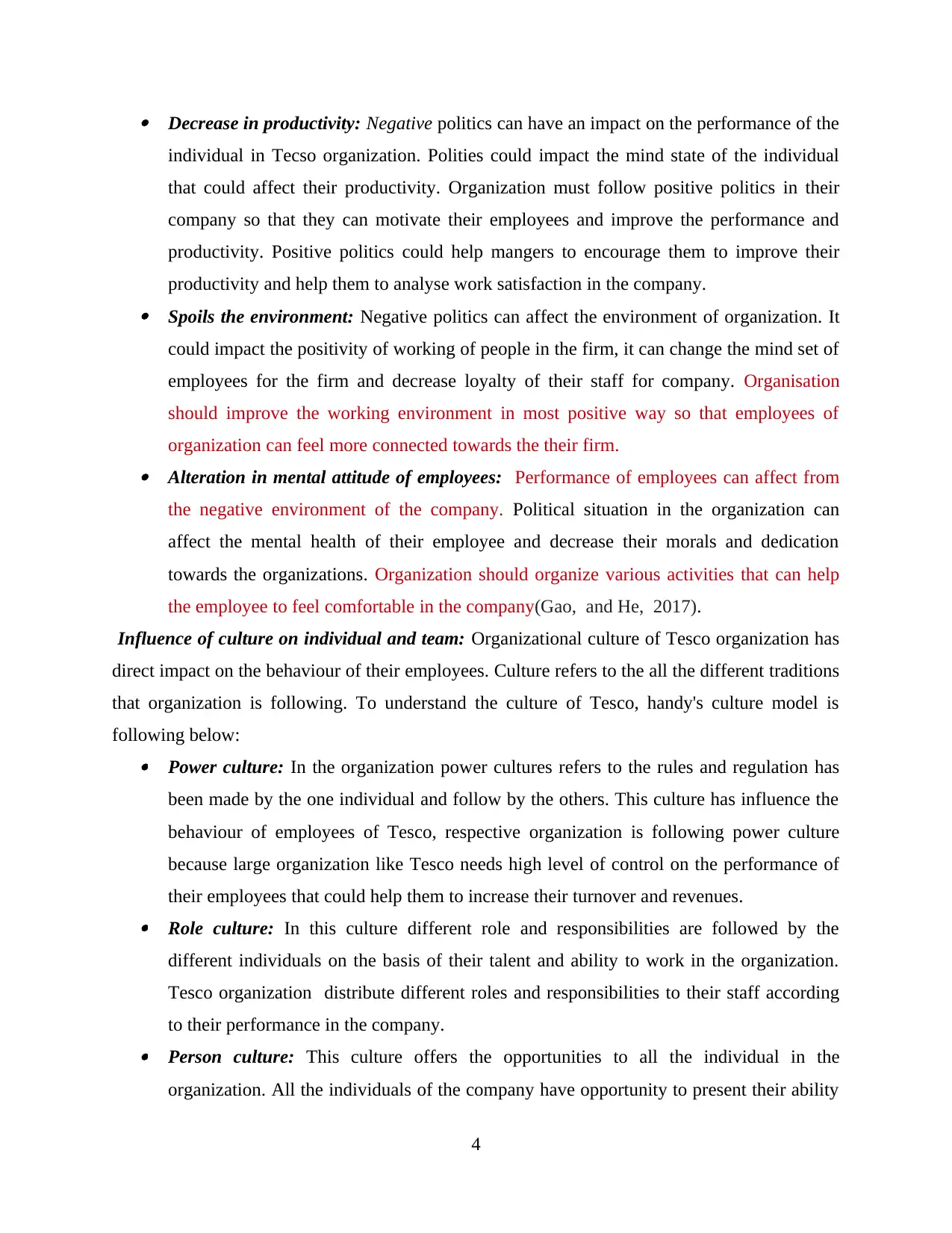
Decrease in productivity: Negative politics can have an impact on the performance of the
individual in Tecso organization. Polities could impact the mind state of the individual
that could affect their productivity. Organization must follow positive politics in their
company so that they can motivate their employees and improve the performance and
productivity. Positive politics could help mangers to encourage them to improve their
productivity and help them to analyse work satisfaction in the company. Spoils the environment: Negative politics can affect the environment of organization. It
could impact the positivity of working of people in the firm, it can change the mind set of
employees for the firm and decrease loyalty of their staff for company. Organisation
should improve the working environment in most positive way so that employees of
organization can feel more connected towards the their firm. Alteration in mental attitude of employees: Performance of employees can affect from
the negative environment of the company. Political situation in the organization can
affect the mental health of their employee and decrease their morals and dedication
towards the organizations. Organization should organize various activities that can help
the employee to feel comfortable in the company(Gao, and He, 2017).
Influence of culture on individual and team: Organizational culture of Tesco organization has
direct impact on the behaviour of their employees. Culture refers to the all the different traditions
that organization is following. To understand the culture of Tesco, handy's culture model is
following below: Power culture: In the organization power cultures refers to the rules and regulation has
been made by the one individual and follow by the others. This culture has influence the
behaviour of employees of Tesco, respective organization is following power culture
because large organization like Tesco needs high level of control on the performance of
their employees that could help them to increase their turnover and revenues. Role culture: In this culture different role and responsibilities are followed by the
different individuals on the basis of their talent and ability to work in the organization.
Tesco organization distribute different roles and responsibilities to their staff according
to their performance in the company. Person culture: This culture offers the opportunities to all the individual in the
organization. All the individuals of the company have opportunity to present their ability
4
individual in Tecso organization. Polities could impact the mind state of the individual
that could affect their productivity. Organization must follow positive politics in their
company so that they can motivate their employees and improve the performance and
productivity. Positive politics could help mangers to encourage them to improve their
productivity and help them to analyse work satisfaction in the company. Spoils the environment: Negative politics can affect the environment of organization. It
could impact the positivity of working of people in the firm, it can change the mind set of
employees for the firm and decrease loyalty of their staff for company. Organisation
should improve the working environment in most positive way so that employees of
organization can feel more connected towards the their firm. Alteration in mental attitude of employees: Performance of employees can affect from
the negative environment of the company. Political situation in the organization can
affect the mental health of their employee and decrease their morals and dedication
towards the organizations. Organization should organize various activities that can help
the employee to feel comfortable in the company(Gao, and He, 2017).
Influence of culture on individual and team: Organizational culture of Tesco organization has
direct impact on the behaviour of their employees. Culture refers to the all the different traditions
that organization is following. To understand the culture of Tesco, handy's culture model is
following below: Power culture: In the organization power cultures refers to the rules and regulation has
been made by the one individual and follow by the others. This culture has influence the
behaviour of employees of Tesco, respective organization is following power culture
because large organization like Tesco needs high level of control on the performance of
their employees that could help them to increase their turnover and revenues. Role culture: In this culture different role and responsibilities are followed by the
different individuals on the basis of their talent and ability to work in the organization.
Tesco organization distribute different roles and responsibilities to their staff according
to their performance in the company. Person culture: This culture offers the opportunities to all the individual in the
organization. All the individuals of the company have opportunity to present their ability
4
⊘ This is a preview!⊘
Do you want full access?
Subscribe today to unlock all pages.

Trusted by 1+ million students worldwide
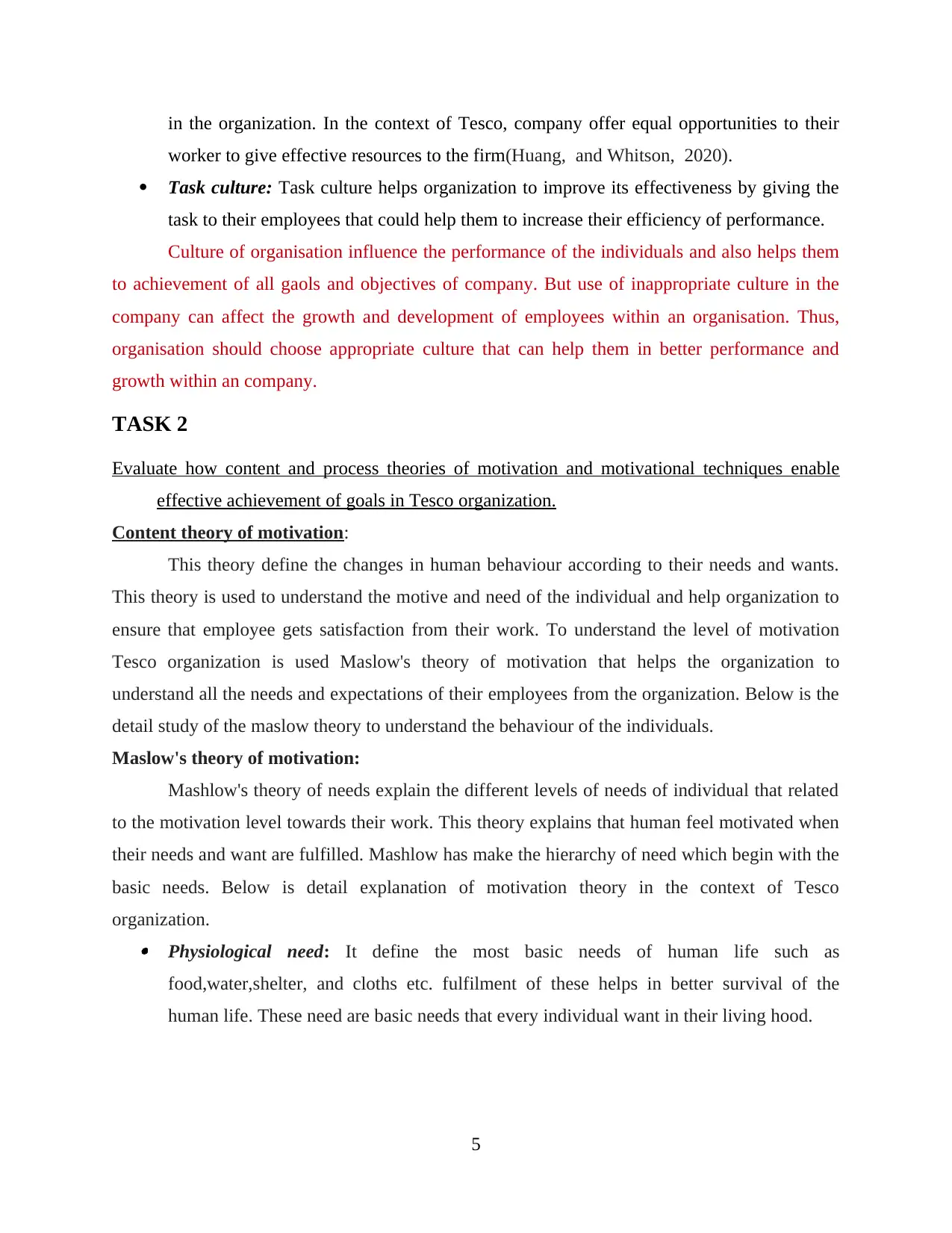
in the organization. In the context of Tesco, company offer equal opportunities to their
worker to give effective resources to the firm(Huang, and Whitson, 2020).
Task culture: Task culture helps organization to improve its effectiveness by giving the
task to their employees that could help them to increase their efficiency of performance.
Culture of organisation influence the performance of the individuals and also helps them
to achievement of all gaols and objectives of company. But use of inappropriate culture in the
company can affect the growth and development of employees within an organisation. Thus,
organisation should choose appropriate culture that can help them in better performance and
growth within an company.
TASK 2
Evaluate how content and process theories of motivation and motivational techniques enable
effective achievement of goals in Tesco organization.
Content theory of motivation:
This theory define the changes in human behaviour according to their needs and wants.
This theory is used to understand the motive and need of the individual and help organization to
ensure that employee gets satisfaction from their work. To understand the level of motivation
Tesco organization is used Maslow's theory of motivation that helps the organization to
understand all the needs and expectations of their employees from the organization. Below is the
detail study of the maslow theory to understand the behaviour of the individuals.
Maslow's theory of motivation:
Mashlow's theory of needs explain the different levels of needs of individual that related
to the motivation level towards their work. This theory explains that human feel motivated when
their needs and want are fulfilled. Mashlow has make the hierarchy of need which begin with the
basic needs. Below is detail explanation of motivation theory in the context of Tesco
organization. Physiological need: It define the most basic needs of human life such as
food,water,shelter, and cloths etc. fulfilment of these helps in better survival of the
human life. These need are basic needs that every individual want in their living hood.
5
worker to give effective resources to the firm(Huang, and Whitson, 2020).
Task culture: Task culture helps organization to improve its effectiveness by giving the
task to their employees that could help them to increase their efficiency of performance.
Culture of organisation influence the performance of the individuals and also helps them
to achievement of all gaols and objectives of company. But use of inappropriate culture in the
company can affect the growth and development of employees within an organisation. Thus,
organisation should choose appropriate culture that can help them in better performance and
growth within an company.
TASK 2
Evaluate how content and process theories of motivation and motivational techniques enable
effective achievement of goals in Tesco organization.
Content theory of motivation:
This theory define the changes in human behaviour according to their needs and wants.
This theory is used to understand the motive and need of the individual and help organization to
ensure that employee gets satisfaction from their work. To understand the level of motivation
Tesco organization is used Maslow's theory of motivation that helps the organization to
understand all the needs and expectations of their employees from the organization. Below is the
detail study of the maslow theory to understand the behaviour of the individuals.
Maslow's theory of motivation:
Mashlow's theory of needs explain the different levels of needs of individual that related
to the motivation level towards their work. This theory explains that human feel motivated when
their needs and want are fulfilled. Mashlow has make the hierarchy of need which begin with the
basic needs. Below is detail explanation of motivation theory in the context of Tesco
organization. Physiological need: It define the most basic needs of human life such as
food,water,shelter, and cloths etc. fulfilment of these helps in better survival of the
human life. These need are basic needs that every individual want in their living hood.
5
Paraphrase This Document
Need a fresh take? Get an instant paraphrase of this document with our AI Paraphraser
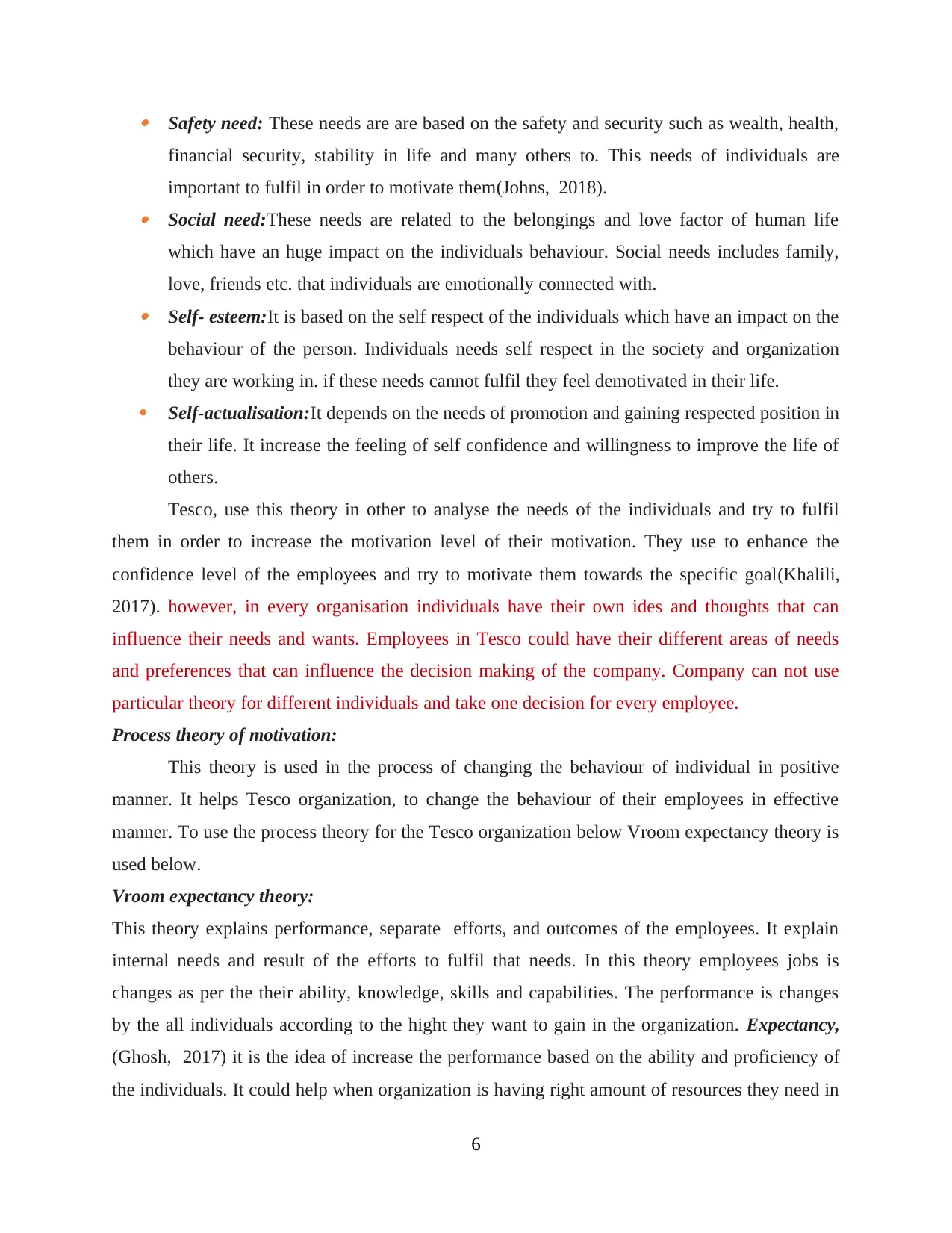
Safety need: These needs are are based on the safety and security such as wealth, health,
financial security, stability in life and many others to. This needs of individuals are
important to fulfil in order to motivate them(Johns, 2018). Social need:These needs are related to the belongings and love factor of human life
which have an huge impact on the individuals behaviour. Social needs includes family,
love, friends etc. that individuals are emotionally connected with. Self- esteem:It is based on the self respect of the individuals which have an impact on the
behaviour of the person. Individuals needs self respect in the society and organization
they are working in. if these needs cannot fulfil they feel demotivated in their life.
Self-actualisation:It depends on the needs of promotion and gaining respected position in
their life. It increase the feeling of self confidence and willingness to improve the life of
others.
Tesco, use this theory in other to analyse the needs of the individuals and try to fulfil
them in order to increase the motivation level of their motivation. They use to enhance the
confidence level of the employees and try to motivate them towards the specific goal(Khalili,
2017). however, in every organisation individuals have their own ides and thoughts that can
influence their needs and wants. Employees in Tesco could have their different areas of needs
and preferences that can influence the decision making of the company. Company can not use
particular theory for different individuals and take one decision for every employee.
Process theory of motivation:
This theory is used in the process of changing the behaviour of individual in positive
manner. It helps Tesco organization, to change the behaviour of their employees in effective
manner. To use the process theory for the Tesco organization below Vroom expectancy theory is
used below.
Vroom expectancy theory:
This theory explains performance, separate efforts, and outcomes of the employees. It explain
internal needs and result of the efforts to fulfil that needs. In this theory employees jobs is
changes as per the their ability, knowledge, skills and capabilities. The performance is changes
by the all individuals according to the hight they want to gain in the organization. Expectancy,
(Ghosh, 2017) it is the idea of increase the performance based on the ability and proficiency of
the individuals. It could help when organization is having right amount of resources they need in
6
financial security, stability in life and many others to. This needs of individuals are
important to fulfil in order to motivate them(Johns, 2018). Social need:These needs are related to the belongings and love factor of human life
which have an huge impact on the individuals behaviour. Social needs includes family,
love, friends etc. that individuals are emotionally connected with. Self- esteem:It is based on the self respect of the individuals which have an impact on the
behaviour of the person. Individuals needs self respect in the society and organization
they are working in. if these needs cannot fulfil they feel demotivated in their life.
Self-actualisation:It depends on the needs of promotion and gaining respected position in
their life. It increase the feeling of self confidence and willingness to improve the life of
others.
Tesco, use this theory in other to analyse the needs of the individuals and try to fulfil
them in order to increase the motivation level of their motivation. They use to enhance the
confidence level of the employees and try to motivate them towards the specific goal(Khalili,
2017). however, in every organisation individuals have their own ides and thoughts that can
influence their needs and wants. Employees in Tesco could have their different areas of needs
and preferences that can influence the decision making of the company. Company can not use
particular theory for different individuals and take one decision for every employee.
Process theory of motivation:
This theory is used in the process of changing the behaviour of individual in positive
manner. It helps Tesco organization, to change the behaviour of their employees in effective
manner. To use the process theory for the Tesco organization below Vroom expectancy theory is
used below.
Vroom expectancy theory:
This theory explains performance, separate efforts, and outcomes of the employees. It explain
internal needs and result of the efforts to fulfil that needs. In this theory employees jobs is
changes as per the their ability, knowledge, skills and capabilities. The performance is changes
by the all individuals according to the hight they want to gain in the organization. Expectancy,
(Ghosh, 2017) it is the idea of increase the performance based on the ability and proficiency of
the individuals. It could help when organization is having right amount of resources they need in
6
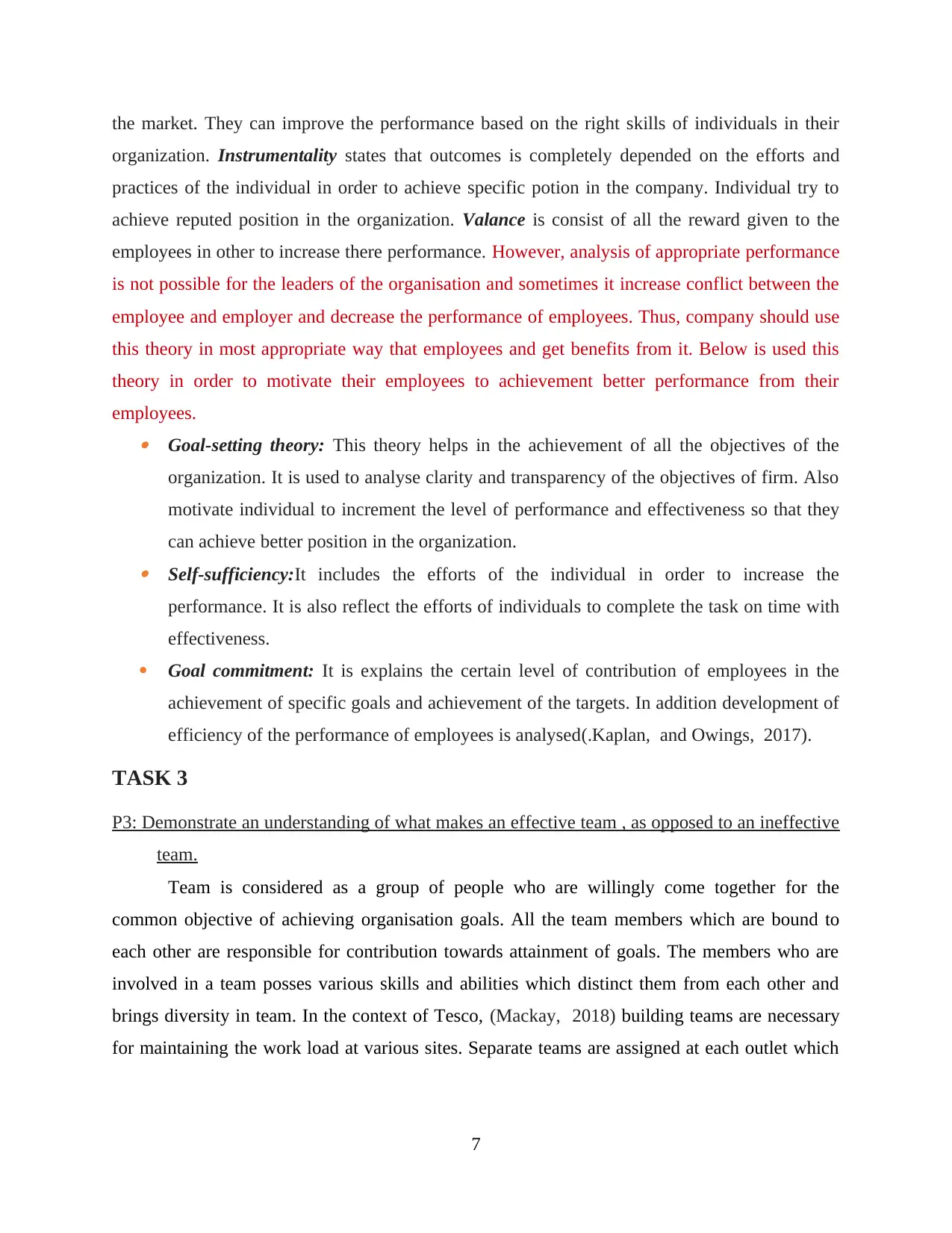
the market. They can improve the performance based on the right skills of individuals in their
organization. Instrumentality states that outcomes is completely depended on the efforts and
practices of the individual in order to achieve specific potion in the company. Individual try to
achieve reputed position in the organization. Valance is consist of all the reward given to the
employees in other to increase there performance. However, analysis of appropriate performance
is not possible for the leaders of the organisation and sometimes it increase conflict between the
employee and employer and decrease the performance of employees. Thus, company should use
this theory in most appropriate way that employees and get benefits from it. Below is used this
theory in order to motivate their employees to achievement better performance from their
employees. Goal-setting theory: This theory helps in the achievement of all the objectives of the
organization. It is used to analyse clarity and transparency of the objectives of firm. Also
motivate individual to increment the level of performance and effectiveness so that they
can achieve better position in the organization. Self-sufficiency:It includes the efforts of the individual in order to increase the
performance. It is also reflect the efforts of individuals to complete the task on time with
effectiveness.
Goal commitment: It is explains the certain level of contribution of employees in the
achievement of specific goals and achievement of the targets. In addition development of
efficiency of the performance of employees is analysed(.Kaplan, and Owings, 2017).
TASK 3
P3: Demonstrate an understanding of what makes an effective team , as opposed to an ineffective
team.
Team is considered as a group of people who are willingly come together for the
common objective of achieving organisation goals. All the team members which are bound to
each other are responsible for contribution towards attainment of goals. The members who are
involved in a team posses various skills and abilities which distinct them from each other and
brings diversity in team. In the context of Tesco, (Mackay, 2018) building teams are necessary
for maintaining the work load at various sites. Separate teams are assigned at each outlet which
7
organization. Instrumentality states that outcomes is completely depended on the efforts and
practices of the individual in order to achieve specific potion in the company. Individual try to
achieve reputed position in the organization. Valance is consist of all the reward given to the
employees in other to increase there performance. However, analysis of appropriate performance
is not possible for the leaders of the organisation and sometimes it increase conflict between the
employee and employer and decrease the performance of employees. Thus, company should use
this theory in most appropriate way that employees and get benefits from it. Below is used this
theory in order to motivate their employees to achievement better performance from their
employees. Goal-setting theory: This theory helps in the achievement of all the objectives of the
organization. It is used to analyse clarity and transparency of the objectives of firm. Also
motivate individual to increment the level of performance and effectiveness so that they
can achieve better position in the organization. Self-sufficiency:It includes the efforts of the individual in order to increase the
performance. It is also reflect the efforts of individuals to complete the task on time with
effectiveness.
Goal commitment: It is explains the certain level of contribution of employees in the
achievement of specific goals and achievement of the targets. In addition development of
efficiency of the performance of employees is analysed(.Kaplan, and Owings, 2017).
TASK 3
P3: Demonstrate an understanding of what makes an effective team , as opposed to an ineffective
team.
Team is considered as a group of people who are willingly come together for the
common objective of achieving organisation goals. All the team members which are bound to
each other are responsible for contribution towards attainment of goals. The members who are
involved in a team posses various skills and abilities which distinct them from each other and
brings diversity in team. In the context of Tesco, (Mackay, 2018) building teams are necessary
for maintaining the work load at various sites. Separate teams are assigned at each outlet which
7
⊘ This is a preview!⊘
Do you want full access?
Subscribe today to unlock all pages.

Trusted by 1+ million students worldwide
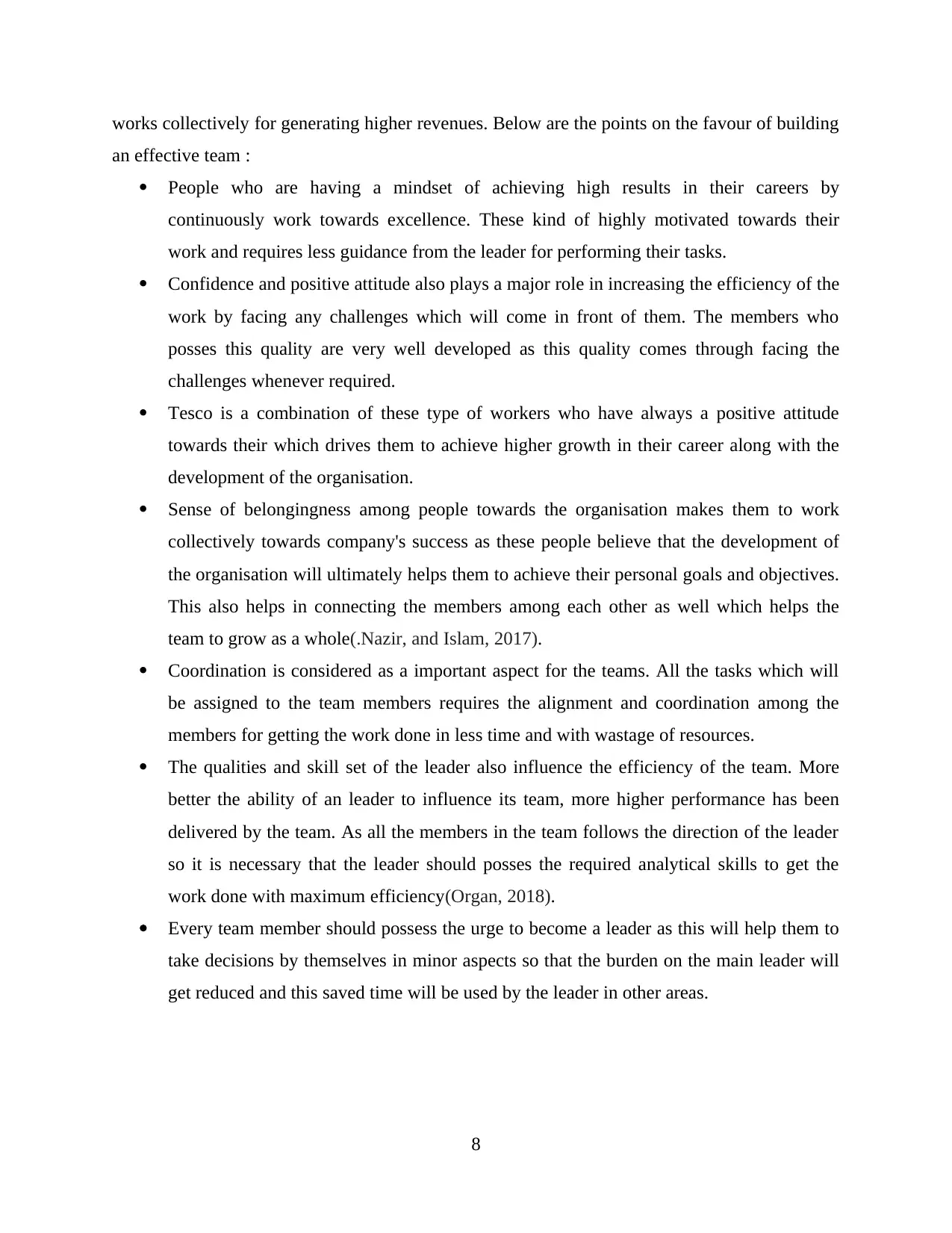
works collectively for generating higher revenues. Below are the points on the favour of building
an effective team :
People who are having a mindset of achieving high results in their careers by
continuously work towards excellence. These kind of highly motivated towards their
work and requires less guidance from the leader for performing their tasks.
Confidence and positive attitude also plays a major role in increasing the efficiency of the
work by facing any challenges which will come in front of them. The members who
posses this quality are very well developed as this quality comes through facing the
challenges whenever required.
Tesco is a combination of these type of workers who have always a positive attitude
towards their which drives them to achieve higher growth in their career along with the
development of the organisation.
Sense of belongingness among people towards the organisation makes them to work
collectively towards company's success as these people believe that the development of
the organisation will ultimately helps them to achieve their personal goals and objectives.
This also helps in connecting the members among each other as well which helps the
team to grow as a whole(.Nazir, and Islam, 2017).
Coordination is considered as a important aspect for the teams. All the tasks which will
be assigned to the team members requires the alignment and coordination among the
members for getting the work done in less time and with wastage of resources.
The qualities and skill set of the leader also influence the efficiency of the team. More
better the ability of an leader to influence its team, more higher performance has been
delivered by the team. As all the members in the team follows the direction of the leader
so it is necessary that the leader should posses the required analytical skills to get the
work done with maximum efficiency(Organ, 2018).
Every team member should possess the urge to become a leader as this will help them to
take decisions by themselves in minor aspects so that the burden on the main leader will
get reduced and this saved time will be used by the leader in other areas.
8
an effective team :
People who are having a mindset of achieving high results in their careers by
continuously work towards excellence. These kind of highly motivated towards their
work and requires less guidance from the leader for performing their tasks.
Confidence and positive attitude also plays a major role in increasing the efficiency of the
work by facing any challenges which will come in front of them. The members who
posses this quality are very well developed as this quality comes through facing the
challenges whenever required.
Tesco is a combination of these type of workers who have always a positive attitude
towards their which drives them to achieve higher growth in their career along with the
development of the organisation.
Sense of belongingness among people towards the organisation makes them to work
collectively towards company's success as these people believe that the development of
the organisation will ultimately helps them to achieve their personal goals and objectives.
This also helps in connecting the members among each other as well which helps the
team to grow as a whole(.Nazir, and Islam, 2017).
Coordination is considered as a important aspect for the teams. All the tasks which will
be assigned to the team members requires the alignment and coordination among the
members for getting the work done in less time and with wastage of resources.
The qualities and skill set of the leader also influence the efficiency of the team. More
better the ability of an leader to influence its team, more higher performance has been
delivered by the team. As all the members in the team follows the direction of the leader
so it is necessary that the leader should posses the required analytical skills to get the
work done with maximum efficiency(Organ, 2018).
Every team member should possess the urge to become a leader as this will help them to
take decisions by themselves in minor aspects so that the burden on the main leader will
get reduced and this saved time will be used by the leader in other areas.
8
Paraphrase This Document
Need a fresh take? Get an instant paraphrase of this document with our AI Paraphraser
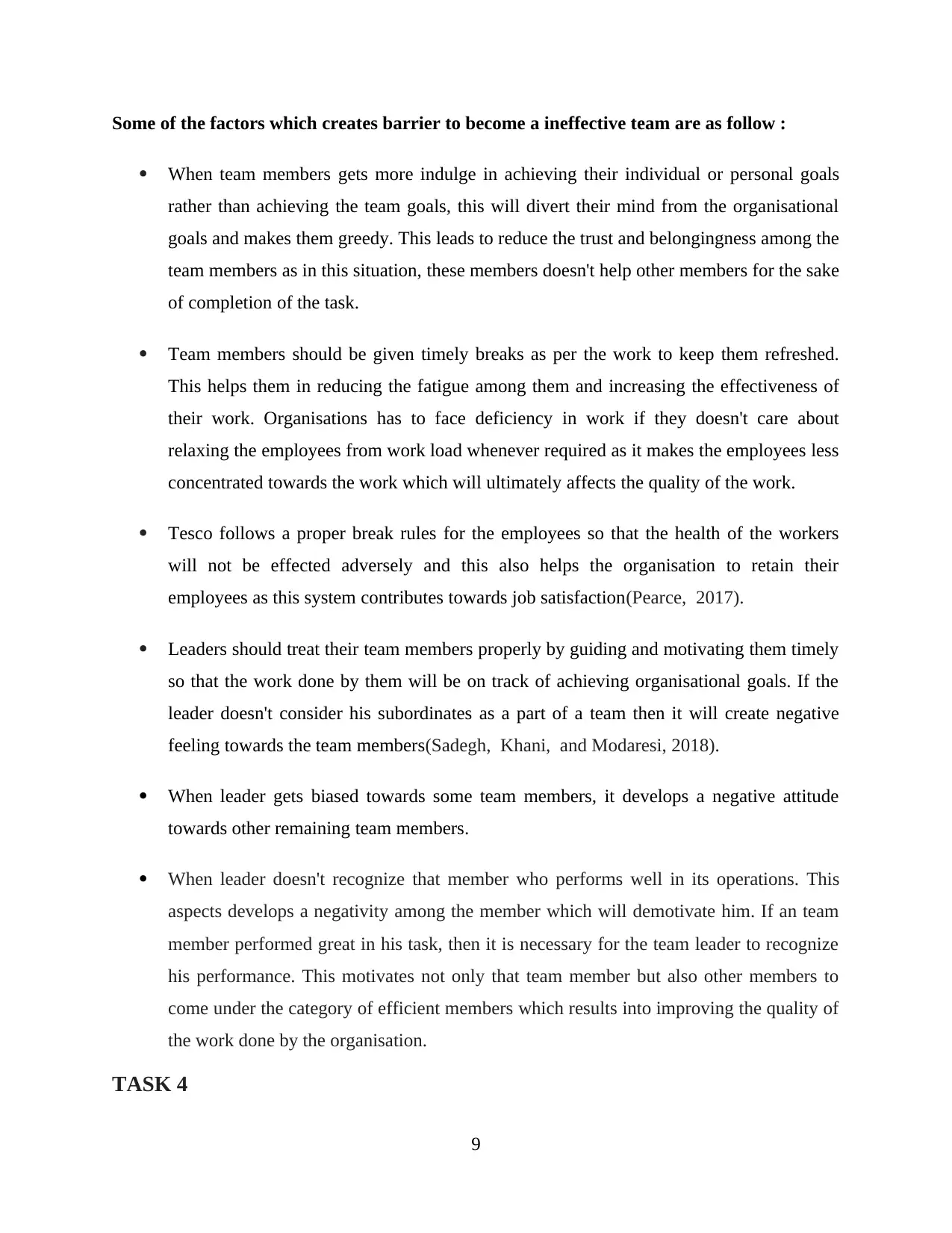
Some of the factors which creates barrier to become a ineffective team are as follow :
When team members gets more indulge in achieving their individual or personal goals
rather than achieving the team goals, this will divert their mind from the organisational
goals and makes them greedy. This leads to reduce the trust and belongingness among the
team members as in this situation, these members doesn't help other members for the sake
of completion of the task.
Team members should be given timely breaks as per the work to keep them refreshed.
This helps them in reducing the fatigue among them and increasing the effectiveness of
their work. Organisations has to face deficiency in work if they doesn't care about
relaxing the employees from work load whenever required as it makes the employees less
concentrated towards the work which will ultimately affects the quality of the work.
Tesco follows a proper break rules for the employees so that the health of the workers
will not be effected adversely and this also helps the organisation to retain their
employees as this system contributes towards job satisfaction(Pearce, 2017).
Leaders should treat their team members properly by guiding and motivating them timely
so that the work done by them will be on track of achieving organisational goals. If the
leader doesn't consider his subordinates as a part of a team then it will create negative
feeling towards the team members(Sadegh, Khani, and Modaresi, 2018).
When leader gets biased towards some team members, it develops a negative attitude
towards other remaining team members.
When leader doesn't recognize that member who performs well in its operations. This
aspects develops a negativity among the member which will demotivate him. If an team
member performed great in his task, then it is necessary for the team leader to recognize
his performance. This motivates not only that team member but also other members to
come under the category of efficient members which results into improving the quality of
the work done by the organisation.
TASK 4
9
When team members gets more indulge in achieving their individual or personal goals
rather than achieving the team goals, this will divert their mind from the organisational
goals and makes them greedy. This leads to reduce the trust and belongingness among the
team members as in this situation, these members doesn't help other members for the sake
of completion of the task.
Team members should be given timely breaks as per the work to keep them refreshed.
This helps them in reducing the fatigue among them and increasing the effectiveness of
their work. Organisations has to face deficiency in work if they doesn't care about
relaxing the employees from work load whenever required as it makes the employees less
concentrated towards the work which will ultimately affects the quality of the work.
Tesco follows a proper break rules for the employees so that the health of the workers
will not be effected adversely and this also helps the organisation to retain their
employees as this system contributes towards job satisfaction(Pearce, 2017).
Leaders should treat their team members properly by guiding and motivating them timely
so that the work done by them will be on track of achieving organisational goals. If the
leader doesn't consider his subordinates as a part of a team then it will create negative
feeling towards the team members(Sadegh, Khani, and Modaresi, 2018).
When leader gets biased towards some team members, it develops a negative attitude
towards other remaining team members.
When leader doesn't recognize that member who performs well in its operations. This
aspects develops a negativity among the member which will demotivate him. If an team
member performed great in his task, then it is necessary for the team leader to recognize
his performance. This motivates not only that team member but also other members to
come under the category of efficient members which results into improving the quality of
the work done by the organisation.
TASK 4
9
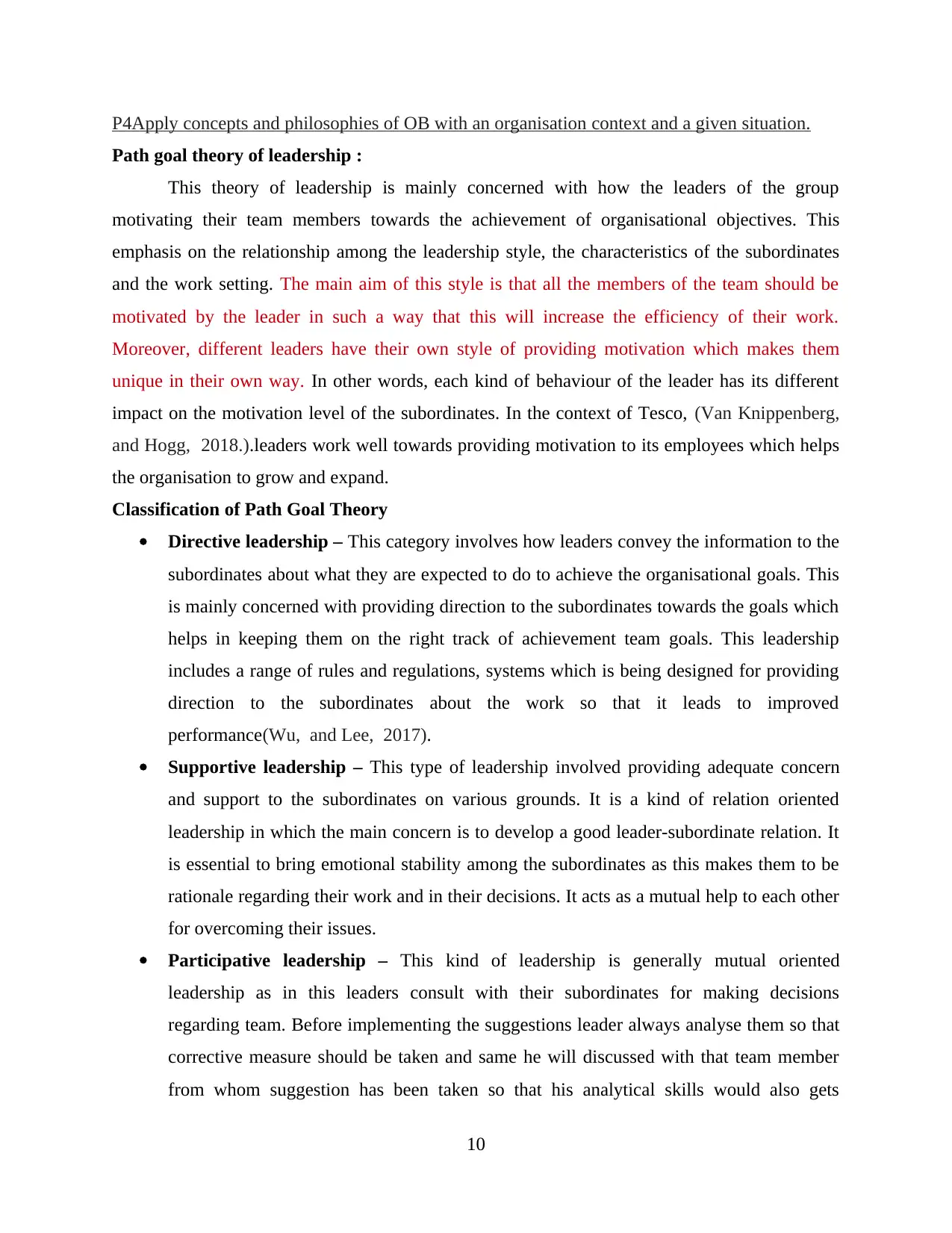
P4Apply concepts and philosophies of OB with an organisation context and a given situation.
Path goal theory of leadership :
This theory of leadership is mainly concerned with how the leaders of the group
motivating their team members towards the achievement of organisational objectives. This
emphasis on the relationship among the leadership style, the characteristics of the subordinates
and the work setting. The main aim of this style is that all the members of the team should be
motivated by the leader in such a way that this will increase the efficiency of their work.
Moreover, different leaders have their own style of providing motivation which makes them
unique in their own way. In other words, each kind of behaviour of the leader has its different
impact on the motivation level of the subordinates. In the context of Tesco, (Van Knippenberg,
and Hogg, 2018.).leaders work well towards providing motivation to its employees which helps
the organisation to grow and expand.
Classification of Path Goal Theory
Directive leadership – This category involves how leaders convey the information to the
subordinates about what they are expected to do to achieve the organisational goals. This
is mainly concerned with providing direction to the subordinates towards the goals which
helps in keeping them on the right track of achievement team goals. This leadership
includes a range of rules and regulations, systems which is being designed for providing
direction to the subordinates about the work so that it leads to improved
performance(Wu, and Lee, 2017).
Supportive leadership – This type of leadership involved providing adequate concern
and support to the subordinates on various grounds. It is a kind of relation oriented
leadership in which the main concern is to develop a good leader-subordinate relation. It
is essential to bring emotional stability among the subordinates as this makes them to be
rationale regarding their work and in their decisions. It acts as a mutual help to each other
for overcoming their issues.
Participative leadership – This kind of leadership is generally mutual oriented
leadership as in this leaders consult with their subordinates for making decisions
regarding team. Before implementing the suggestions leader always analyse them so that
corrective measure should be taken and same he will discussed with that team member
from whom suggestion has been taken so that his analytical skills would also gets
10
Path goal theory of leadership :
This theory of leadership is mainly concerned with how the leaders of the group
motivating their team members towards the achievement of organisational objectives. This
emphasis on the relationship among the leadership style, the characteristics of the subordinates
and the work setting. The main aim of this style is that all the members of the team should be
motivated by the leader in such a way that this will increase the efficiency of their work.
Moreover, different leaders have their own style of providing motivation which makes them
unique in their own way. In other words, each kind of behaviour of the leader has its different
impact on the motivation level of the subordinates. In the context of Tesco, (Van Knippenberg,
and Hogg, 2018.).leaders work well towards providing motivation to its employees which helps
the organisation to grow and expand.
Classification of Path Goal Theory
Directive leadership – This category involves how leaders convey the information to the
subordinates about what they are expected to do to achieve the organisational goals. This
is mainly concerned with providing direction to the subordinates towards the goals which
helps in keeping them on the right track of achievement team goals. This leadership
includes a range of rules and regulations, systems which is being designed for providing
direction to the subordinates about the work so that it leads to improved
performance(Wu, and Lee, 2017).
Supportive leadership – This type of leadership involved providing adequate concern
and support to the subordinates on various grounds. It is a kind of relation oriented
leadership in which the main concern is to develop a good leader-subordinate relation. It
is essential to bring emotional stability among the subordinates as this makes them to be
rationale regarding their work and in their decisions. It acts as a mutual help to each other
for overcoming their issues.
Participative leadership – This kind of leadership is generally mutual oriented
leadership as in this leaders consult with their subordinates for making decisions
regarding team. Before implementing the suggestions leader always analyse them so that
corrective measure should be taken and same he will discussed with that team member
from whom suggestion has been taken so that his analytical skills would also gets
10
⊘ This is a preview!⊘
Do you want full access?
Subscribe today to unlock all pages.

Trusted by 1+ million students worldwide
1 out of 15
Related Documents
Your All-in-One AI-Powered Toolkit for Academic Success.
+13062052269
info@desklib.com
Available 24*7 on WhatsApp / Email
![[object Object]](/_next/static/media/star-bottom.7253800d.svg)
Unlock your academic potential
Copyright © 2020–2026 A2Z Services. All Rights Reserved. Developed and managed by ZUCOL.



